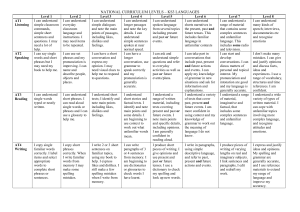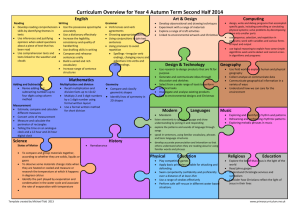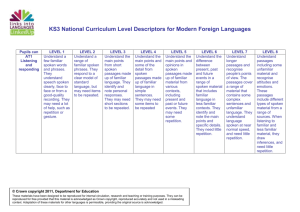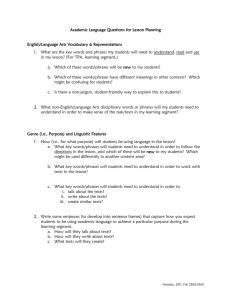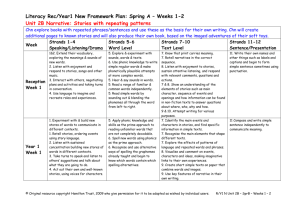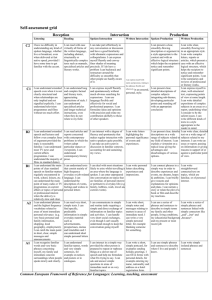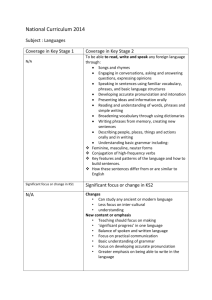National Curriculum levels in pupil-friendly
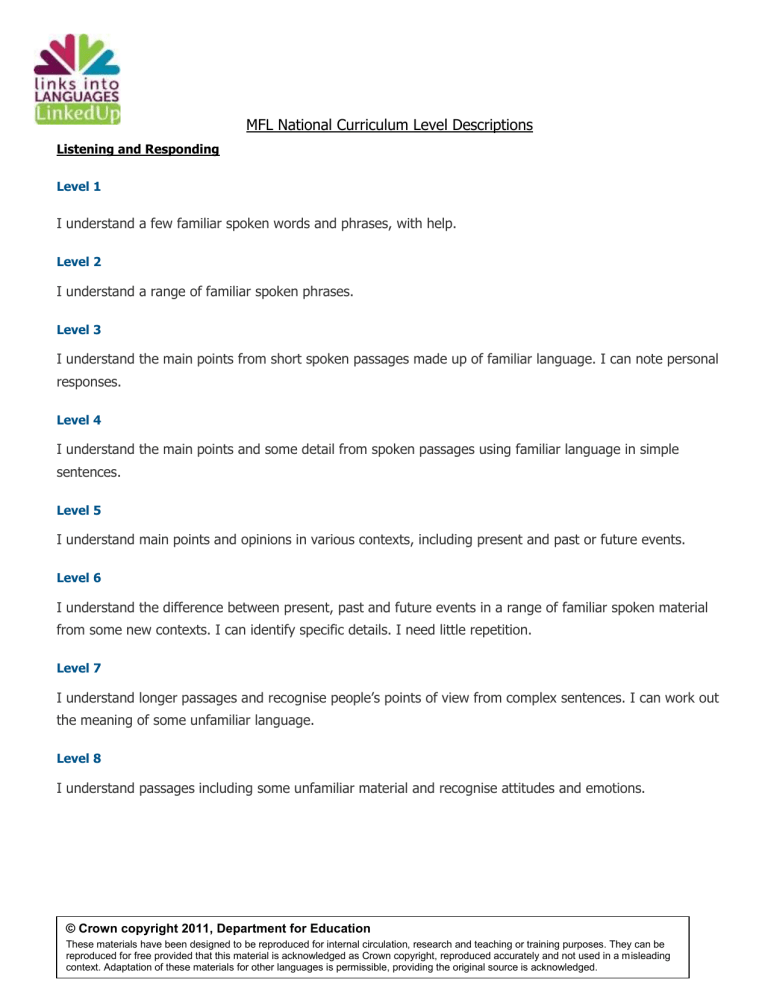
MFL National Curriculum Level Descriptions
Listening and Responding
Level 1
I understand a few familiar spoken words and phrases, with help.
Level 2
I understand a range of familiar spoken phrases.
Level 3
I understand the main points from short spoken passages made up of familiar language. I can note personal responses.
Level 4
I understand the main points and some detail from spoken passages using familiar language in simple sentences.
Level 5
I understand main points and opinions in various contexts, including present and past or future events.
Level 6
I understand the difference between present, past and future events in a range of familiar spoken material from some new contexts. I can identify specific details. I need little repetition.
Level 7
I understand longer passages and recognise people’s points of view from complex sentences. I can work out the meaning of some unfamiliar language.
Level 8
I understand passages including some unfamiliar material and recognise attitudes and emotions.
© Crown copyright 2011, Department for Education
These materials have been designed to be reproduced for internal circulation, research and teaching or training purposes. They can be reproduced for free provided that this material is acknowledged as Crown copyright, reproduced accurately and not used in a misleading context. Adaptation of these materials for other languages is permissible, providing the original source is acknowledged.
Exceptional performance
I understand the gist of a range of authentic passages in familiar contexts. These passages cover a range of factual and imaginative speech, some of which expresses different points of view, issues and concerns. I summarise, explain extracts and report, orally or in writing.
Speaking
Level 1
I say single words and short phrases with support. I try to pronounce words correctly.
Level 2
I use set phrases to give basic information. My pronunciation is fairly clear.
Level 3
I take part in brief prepared tasks. I give short personal responses. I can substitute vocabulary into questions or statements.
Level 4
I take part in simple conversations and express opinions. I have begun to substitute single words and phrases. My pronunciation is generally accurate.
Level 5
I give a short prepared talk or take part in short conversations. I ask for and give information, using more than one time frame. I can vary my language and extend my answers. My language is generally accurate.
Level 6
I can answer questions about a short prepared talk. I use varied language and extended phrases. I apply my previous knowledge to work out meanings in new contexts.
Level 7
I answer unprepared questions. I begin and develop conversations and discuss matters of personal or topical interest. I improvise and paraphrase. My pronunciation is good.
© Crown copyright 2011, Department for Education. This resource has been created through the LinkedUp Award Scheme.
Level 8
I can narrate events, justify my opinion, discuss facts, ideas and experiences. I use a range of vocabulary, structures and time references. I adapt language to deal with unprepared situations. I speak confidently, with good pronunciation and intonation. My language is mostly accurate.
Exceptional performance
I discuss factual and imaginative topics. I deal with unfamiliar language in informal and formal situations. I speak fluently, give clear messages and make few errors.
Reading and Responding
Level 1
I recognise and read out a few familiar words and phrases. I may need visual clues.
Level 2
I understand familiar written phrases. I match sound to print by reading aloud familiar words and phrases. I look up the meanings of new words in a book or glossary.
Level 3
I understand main points and personal responses in clear short texts. I have begun to read independently, and can use a bilingual dictionary or glossary to look up new words.
Level 4
I understand main points and some detail in short texts. I can use context to work out the meaning of unfamiliar words.
Level 5
I am confident in understanding main points and opinions over various contexts in the present, past or future.
Level 6
I understand familiar language in the present, past and future in less familiar contexts. I note main points and specific details. I choose texts to read independently. I work out the meaning of unfamiliar language .
© Crown copyright 2011, Department for Education. This resource has been created through the LinkedUp Award Scheme.
Level 7
I understand a range of longer texts and note points of view from complex sentences and unfamiliar language. I adapt models from reading to help me speak and write. I use reference materials appropriately.
Level 8
I understand a wide variety of texts including some unfamiliar material. I recognise attitudes and emotions. I read for personal interest and for information, consulting a range of reference sources where appropriate.
Exceptional performance
I understand a wide range of authentic texts in familiar contexts including factual and imaginative material. I understand different points of view, issues and concerns. I summarise, explain extracts and report, orally or in writing. I read independently.
Writing
Level 1
I write or copy words or symbols correctly. I label items and insert words into short phrases or sentences.
Level 2
I use a model to write one or two short sentences. I can fill in a simple form and write familiar short phrases correctly. When I am not copying, my spelling sometimes contains errors.
Level 3
I write a few short familiar sentences with support. I express personal responses. I write short phrases from memory with generally accurate spelling.
Level 4
I write short texts on familiar topics, adapting language that I have already learnt. I can substitute individual words and set phrases. I use dictionaries or glossaries to check words I have learnt.
Level 5
I write short texts on many familiar topics. I use simple sentences in the past or future, and the present. I may make some mistakes. I use dictionaries or glossaries to check my work and look up unknown words.
© Crown copyright 2011, Department for Education. This resource has been created through the LinkedUp Award Scheme.
Level 6
I give and ask for information and opinions. I use descriptive language and a variety of structures. I use my knowledge of structure in new contexts. Although there may be a few mistakes, my meaning is usually clear.
Level 7
I write short or longer articles or stories, giving opinions and points of view upon real and imaginary subjects. I link sentences and paragraphs, adapt structures and ideas from what I have learned. I use reference sources to improve accuracy. I may make occasional mistakes.
Level 8
I produce formal and informal texts in an appropriate style on familiar topics, justifying opinions and finding out views of others. I make few mistakes. I use reference materials to extend my range of language.
Exceptional performance
I communicate ideas accurately and in an appropriate style over a range of familiar topics, both factual and imaginative. I write coherently and accurately. I use resources to help vary the style and scope of my writing.
© Crown copyright 2011, Department for Education. This resource has been created through the LinkedUp Award Scheme.

